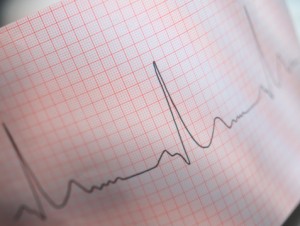Cardiac sarcoidosis raises arrhythmia and heart failure risk
 Cardiac sarcoidosis raises arrhythmia and heart failure risk. Only a small number of people are affected by cardiac sarcoidosis, an inflammatory condition that can affect other organs as well. Cardiac sarcoidosis specifically targets the white blood cells in the heart tissue. These blood cells form clusters, which can then interfere with the heart’s electrical system, leading to irregular heartbeats – arrhythmia.
Cardiac sarcoidosis raises arrhythmia and heart failure risk. Only a small number of people are affected by cardiac sarcoidosis, an inflammatory condition that can affect other organs as well. Cardiac sarcoidosis specifically targets the white blood cells in the heart tissue. These blood cells form clusters, which can then interfere with the heart’s electrical system, leading to irregular heartbeats – arrhythmia.
It is recommended that all persons under the age of 60 be screened for sarcoidosis, as it is a reversible condition. Early detection of cardiac sarcoidosis can prevent complications from arising, including arrhythmia – which increases a person’s risk of stroke – and heart failure.
Types of cardiac sarcoidosis
Cardiac sarcoidosis can present itself in numerous ways, including heart rhythm disorder, heart failure, coronary disease, and pericardial disease.
Heart rhythm disorder: This condition interferes with the heart’s electrical system, which is necessary to maintain a steady and regular heart beat. This condition can be a life-threatening complication of cardiac sarcoidosis, as it creates a heart block.
Heart failure: Cardiac sarcoidosis can cause the heart muscle to become stiff or weak, leading to heart failure. In extreme cases, an aneurysm can form on the heart wall.
Coronary disease: In rare cases, cardiac sarcoidosis can lead to an inflammatory disorder known as vasculitis, which – when severe – leads to coronary disease, contributing to heart attack.
Pericardial disease: Another rare form of cardiac sarcoidosis is pericardial disease, which is inflammation of the sack around the heart.
Cardiac sarcoidosis signs, symptoms, and causes
 The exact cause of cardiac sarcoidosis is unknown, but it is believed to be triggered by the immune system’s over-reaction after exposure to an infection, chemical, or allergen. This reaction leads to inflammation around the heart, causing the white blood cells to cluster, thus causing a heart block.
The exact cause of cardiac sarcoidosis is unknown, but it is believed to be triggered by the immune system’s over-reaction after exposure to an infection, chemical, or allergen. This reaction leads to inflammation around the heart, causing the white blood cells to cluster, thus causing a heart block.
A genetic component may also play a role, as it has been found that persons with siblings or parents with cardiac sarcoidosis have a five times greater risk of developing the condition, compared to the general public with no family history of cardiac sarcoidosis.
Symptoms of cardiac sarcoidosis may seem unrelated, consisting of shortness of breath, heart palpitations, feelings of fainting, loss of consciousness, swelling of the legs, difficulty breathing, and unexplained weight gain. Other symptoms may include recurring lung infections, swelling of lymph nodes, facial rashes, and blurry vision.
African-Americans are more likely to develop cardiac sarcoidosis. Typically, the onset is between the ages of 10 and 49 years old. Lastly, as mentioned, having a family member with cardiac sarcoidosis increases a person’s risk of developing it themselves.
Cardiac sarcoidosis diagnosis and treatment
Numerous tests may be required in order to properly diagnose cardiac sarcoidosis, including electrocardiography, nuclear imaging, cardiac magnetic resonance imaging (cMRI), and a tissue biopsy.
Generally, cardiac sarcoidosis does not require treatment, but when treatment is required, it often involves the most common corticosteroid prednisone, which is an anti-inflammatory. Other steroids may be prescribed as a means to suppress the immune system, and specific medications may be given to combat irregular heartbeat.
Other treatment options include catheter ablation and implantable cardioverter-defibrillator (ICD), which can deliver an electrical shock when needed in order to normalize heartbeats.
COPD raises cardiac death risk in patients with atrial fibrillation
There are close to 24 million people in the United States suffering from COPD or Chronic Obstructive Pulmonary Disorder, and now experts believe this lung disease increases the risk of cardiac death in those with atrial fibrillation. Research conducted through Ghent University Hospital in Belgium indicates that COPD is linked to cardiac issues, such as atrial fibrillation. Continue reading…
-
Weight Loss Has Now A Safe Solution
Have you done everything to make weight loss possible and yet you do
-
Strength Training for Women
There are many misconceptions about stre
-
How we lost weight along with how you can do the same
The Reality About Six Pack Abs Total Scam OR Actually Operates? If you
-
A New Option For Weight Loss Surgery
These days, Jennifer Secrist has little interest in idle activities.
-
The Different Weight Loss Options You Can Consider
Weight loss surgery is dangerous and people are forgetting about this
-
Ditch the Diet - Choose Health Today!
Diets don抰 work. Do these words surprise
- DON'T MISS
- Convenient And Effective Way To Weight Loss With Bistro MD
- EAT CARBS Without Gaining Weight
- Laser Lipolysis: Fat free Body Without Surgical Procedures
- 5 Tips To Maintain Your New Year’s Resolutions
- Weight Loss Green Tea - Is It True Oolong Tea Better You To Loss Weight?
- Exercise And Weight Loss For Women Part 3
- Coconut Oil: Health Benefits, Nutritional Breakdown, Risks
- Are You Responsible Enough To Lose Fat
- Chiropractic Wellness
- Estevia Weight Loss Product Review




